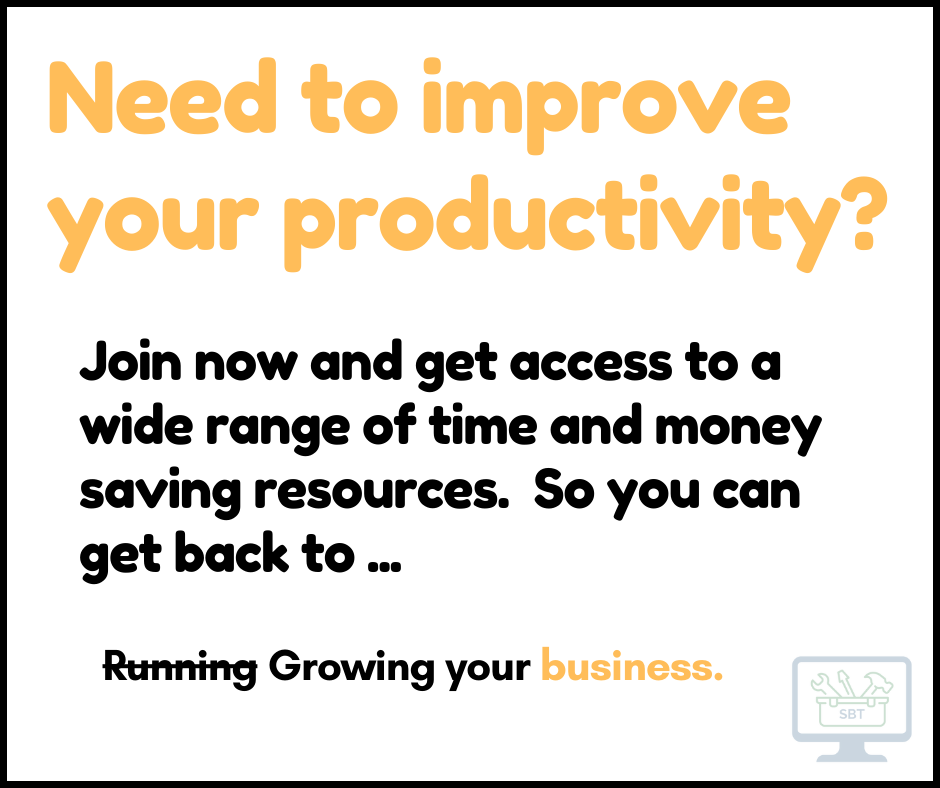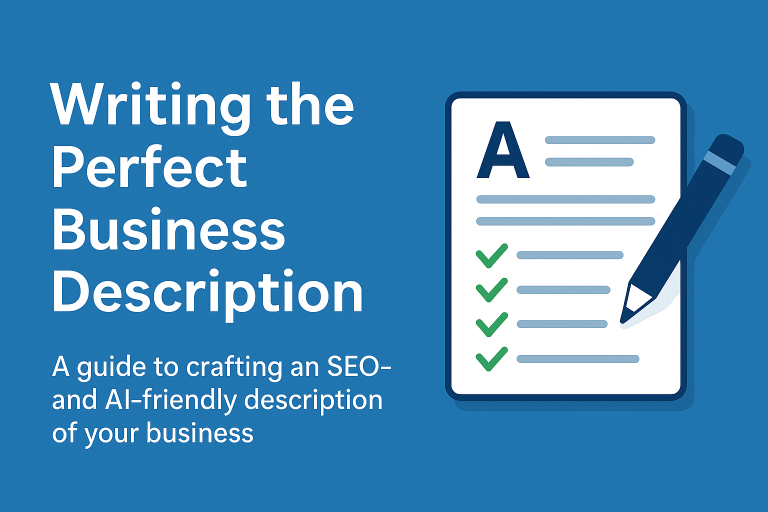Australian small businesses are constantly seeking ways to streamline operations and boost customer relationships. CRM solutions have become indispensable tools for achieving these goals.
At SmallBizToolbox, we’ve seen firsthand how the right CRM for small business in Australia can transform operations. This guide will explore the top CRM options tailored for Australian small businesses, helping you make an informed decision for your company’s future.
What CRM Features Matter Most for Australian Small Businesses?
Australian small businesses need CRM solutions that address their unique needs and market dynamics. We’ve identified key features that can significantly impact how you manage customer relationships and drive growth.
Streamlined Customer Data Management
Effective customer data management forms the foundation of any successful CRM implementation. Australian businesses require systems that capture, organize, and update customer information with ease. Tall Emu CRM works with MYOB and Xero and is the only sales and operations system you will need to manage your customers, stock, orders, and fulfilment. The ability to segment customers based on location, purchase history, or engagement level allows you to tailor your marketing efforts to different regions across Australia.
Robust Sales Pipeline Tracking
A clear view of your sales pipeline proves essential for forecasting and resource allocation. Choose a CRM that provides visual pipeline management, which allows you to track deals from initial contact to closure. Features like automated stage movement and win probability calculations give you a more accurate picture of your sales health. Without sales pipeline software, sales teams may lose track of leads and opportunities, resulting in missed sales.
Seamless Integration with Australian Business Tools
Your CRM should complement the tools you already use. Look for solutions that integrate with popular Australian accounting software (like Xero or MYOB). This integration streamlines invoicing processes and provides a holistic view of customer financial interactions. Additionally, compatibility with local payment gateways and e-commerce platforms can significantly enhance your operational efficiency.
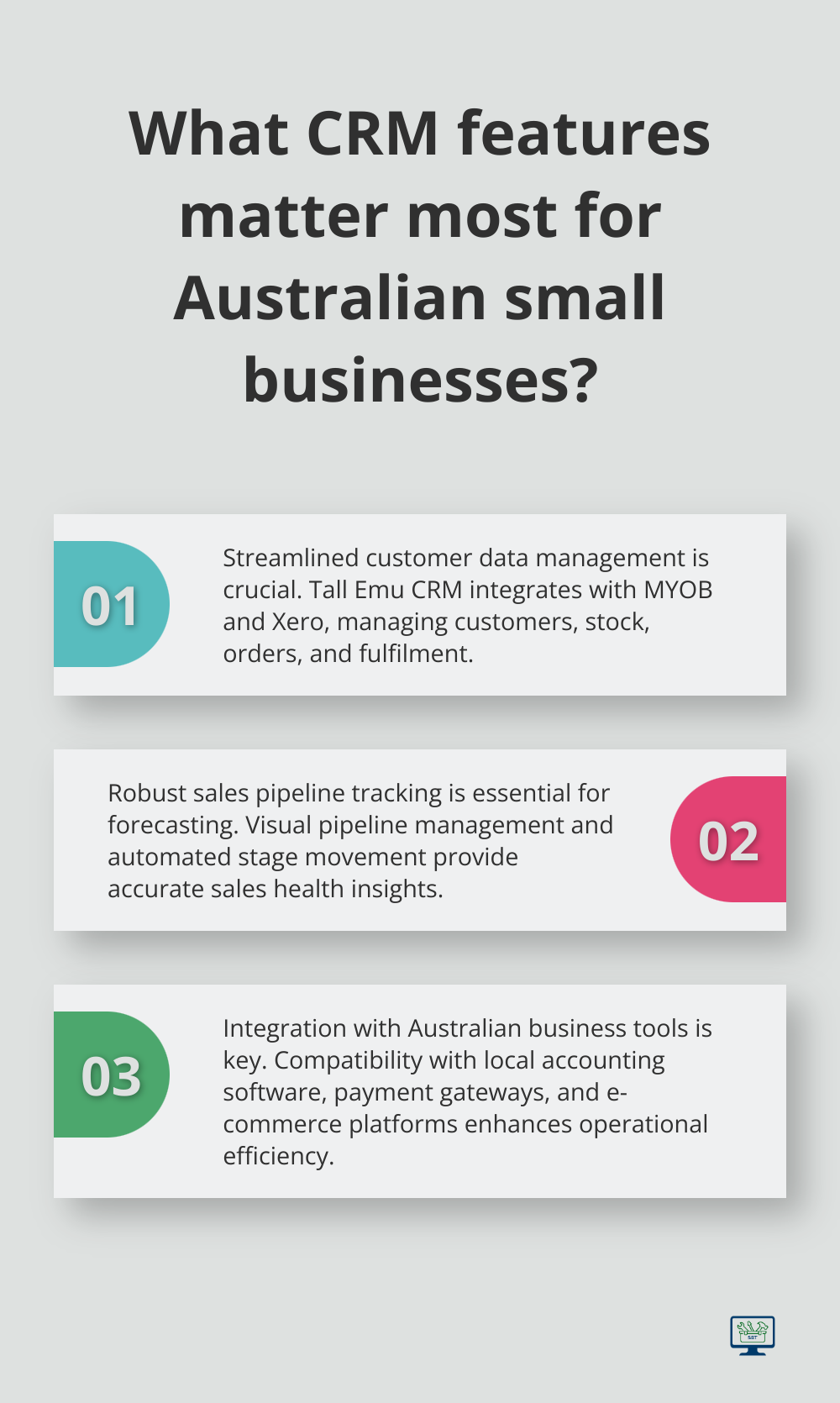
Proper integration can save small businesses hours of manual data entry each week. Try to find a CRM that offers seamless connections to a variety of Australian business tools, ensuring that it becomes a central hub for all customer-related activities.
Mobile Accessibility
In today’s fast-paced business environment, access to your CRM on-the-go is not just a luxury-it’s a necessity. Look for CRM solutions that offer robust mobile apps or responsive web interfaces. This feature allows your team to update customer information, manage deals, and respond to inquiries from anywhere, at any time.
Customization Options
Every business has unique processes and requirements. A CRM that offers extensive customization options allows you to tailor the system to your specific needs. This might include custom fields, personalized dashboards, or the ability to create unique workflows. The right level of customization ensures that your CRM aligns perfectly with your business processes, rather than forcing you to adapt to a rigid system.
The right CRM combines these features to support your specific business needs. Take advantage of free trials (such as the 7-day trial offered by SmallBizToolbox) to test different solutions and find the one that best fits your workflow. As we move forward, let’s explore some of the leading CRM solutions available in the Australian market.
Top CRM Solutions for Australian Small Businesses
Australian small businesses have numerous CRM options to choose from. We’ve analyzed the market and identified five standout solutions that cater specifically to the needs of small businesses in Australia.
Salesforce Essentials: Power-Packed for Small Teams
Salesforce Essentials brings enterprise-level capabilities to small businesses. This CRM offers powerful features like lead and opportunity management, customizable sales processes, and robust reporting tools.
Salesforce Essentials sets itself apart with its AI-powered Einstein Analytics, which provides real-time access to customer data, analytics, and automation across your business to make AI work for you. The platform also integrates excellently with Australian accounting software like Xero and MYOB.
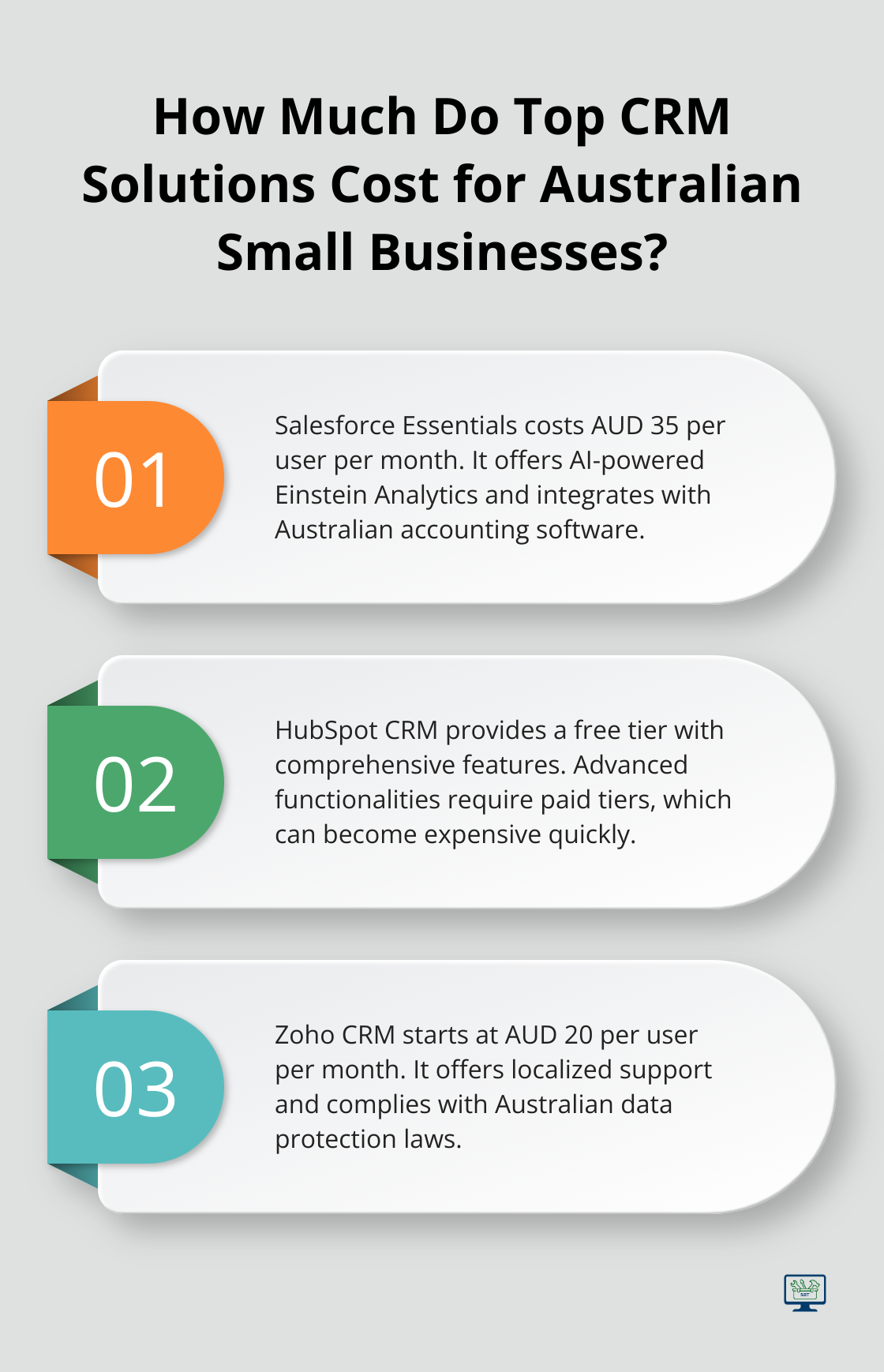
The platform does have a steep learning curve, and some users find the interface cluttered. Pricing starts at AUD 35 per user per month, which might stretch the budget of very small businesses.
HubSpot CRM: Feature-Rich with a Free Tier
HubSpot CRM attracts many Australian small businesses, largely due to its free tier that offers a comprehensive set of features. The platform excels in contact management, email tracking, and pipeline visualization.
HubSpot’s strength lies in its marketing automation capabilities, which allow you to create targeted campaigns based on customer behavior. The CRM also integrates seamlessly with HubSpot’s other tools, creating a unified platform for sales, marketing, and customer service.
While the free version offers many features, advanced functionalities like workflow automation and reporting require paid tiers, which can become expensive quickly.
Zoho CRM: Affordable and Customizable
Zoho CRM stands out for its affordability and high degree of customization. It offers a range of features including lead and contact management, workflow automation, and analytics.
Zoho attracts Australian businesses with its localized support and compliance with Australian data protection laws. The platform also integrates well with other Zoho products, creating a cohesive ecosystem for your business operations.
Zoho’s user interface, while functional, can feel dated compared to some competitors. Pricing starts at AUD 20 per user per month, making it one of the more budget-friendly options on this list.
Pipedrive: Sales-Focused and User-Friendly
Pipedrive focuses on sales teams, offering an intuitive interface and strong pipeline management features. Users praise its visual approach to deal tracking.
The platform’s AI sales assistant (which provides personalized tips and insights) can significantly boost small sales teams. Pipedrive also offers good integration options with popular Australian business tools.
Pipedrive’s marketing and customer service features lag behind some competitors. Pricing starts at AUD 21.90 per user per month.
Microsoft Dynamics 365: Scalable and Integrated
Microsoft Dynamics 365 offers seamless integration with tools like Office 365 and Power BI, making it attractive for small businesses already using Microsoft products. It’s a highly scalable solution that can grow with your business.
Dynamics 365 provides robust features for sales, marketing, and customer service. Its AI capabilities, including predictive lead scoring, can give your sales team a significant edge.
The main drawbacks include its complexity and cost. Small businesses might find it overwhelming and expensive, with pricing starting at AUD 80.50 per user per month for the Sales Professional plan.
While these CRMs offer strong features, it’s important to note that SmallBizToolbox provides a comprehensive suite of tools designed specifically for Australian small businesses, including CRM functionalities. Our solution integrates seamlessly with other essential business tools, offering a holistic approach to business management at a competitive price point of AUD 49 per month.
Now that we’ve explored the top CRM solutions for Australian small businesses, let’s discuss how to choose the right one for your specific needs.
How to Pick the Perfect CRM for Your Small Business
Identify Your Specific Business Requirements
Start with a thorough analysis of your business processes. Pinpoint areas where a CRM can add value. Do you struggle with lead management? Need better customer data organization? Want to automate your sales pipeline? Create a list of must-have features based on your unique business challenges. This step will help you eliminate CRMs that don’t align with your core needs.
Evaluate the Total Cost of Ownership
Consider more than just the monthly subscription fee. Factor in potential expenses for implementation, training, and necessary customizations. Some CRMs might have a lower upfront cost but require significant investment in setup and training. Others offer more comprehensive solutions at a flat rate, which can prove more cost-effective in the long run.
Future-Proof Your Choice
Select a CRM that can grow with your business. Look for solutions that offer scalability in terms of users, features, and data storage. A CRM that fits your current needs might become restrictive as your business expands. Consider your growth projections for the next 3-5 years and ensure the CRM can accommodate that growth without requiring a complete system overhaul.
Prioritize Local Support and Training
The availability of local support can significantly impact your CRM experience. Australian businesses should prioritize CRM providers that offer support during Australian business hours and understand local business practices. Check if the provider offers comprehensive training resources (including webinars, documentation, and personalized onboarding). This support can dramatically reduce the learning curve and ensure you maximize the CRM’s potential.
Leverage Free Trials Effectively
Most CRM providers offer free trials. Try a range of intelligent CRM and ERP business applications free for 30 days. Use this opportunity to thoroughly test the system. Create a checklist of features you want to evaluate and involve key team members in the trial process. Pay attention to the user interface, ease of data input, and the quality of reports generated. Don’t hesitate to contact the provider’s support team during the trial to gauge their responsiveness and expertise.
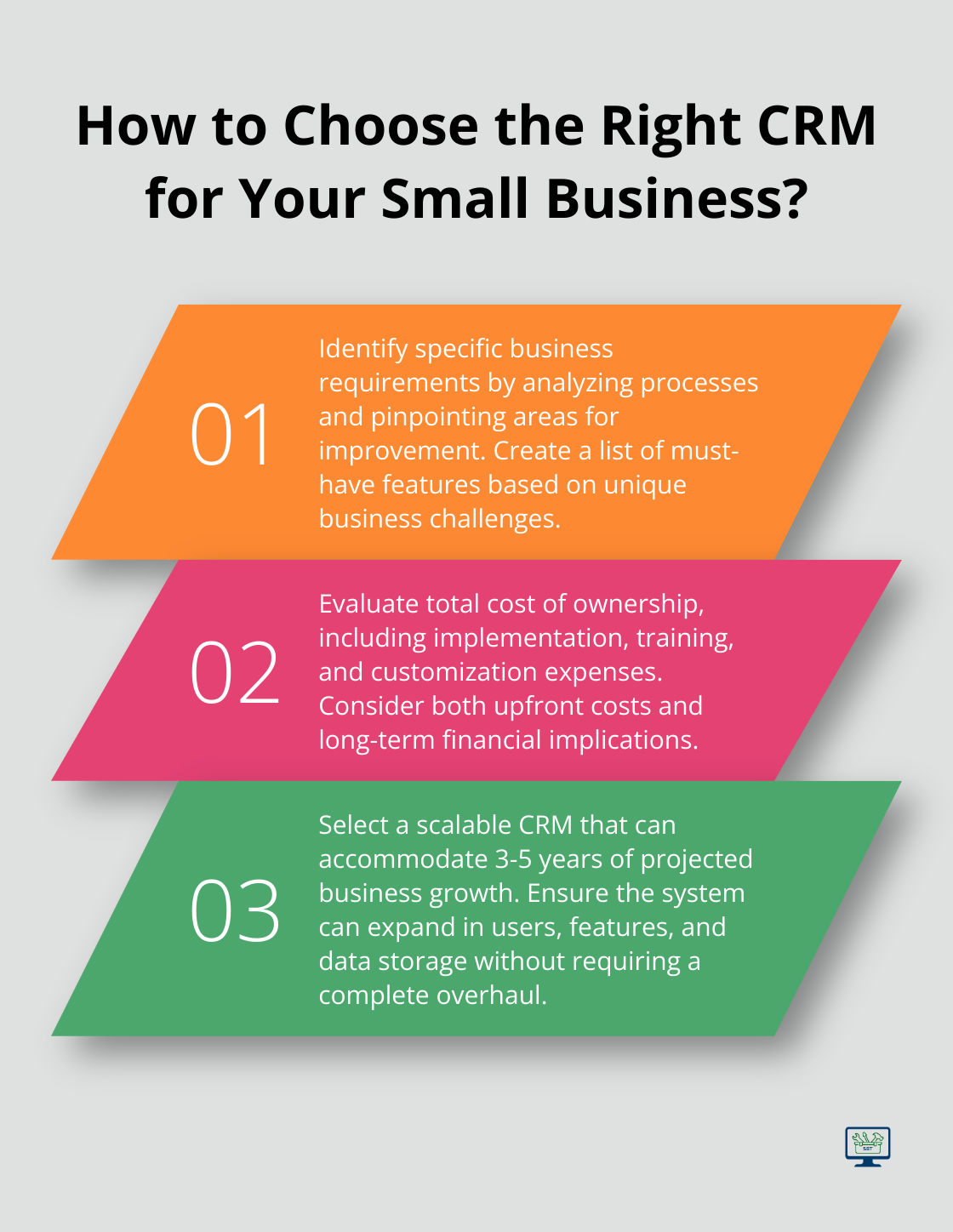
The right CRM aligns with your business processes and culture. Take time to thoroughly evaluate your options, and you’ll implement a CRM that drives real value for your small business.
Final Thoughts
A CRM for small businesses in Australia can transform your company’s growth and customer relationships. The right solution will streamline operations, enhance customer interactions, and provide valuable insights for informed decision-making. Your chosen CRM should offer robust data management, intuitive pipeline tracking, and seamless integration with Australian business tools.
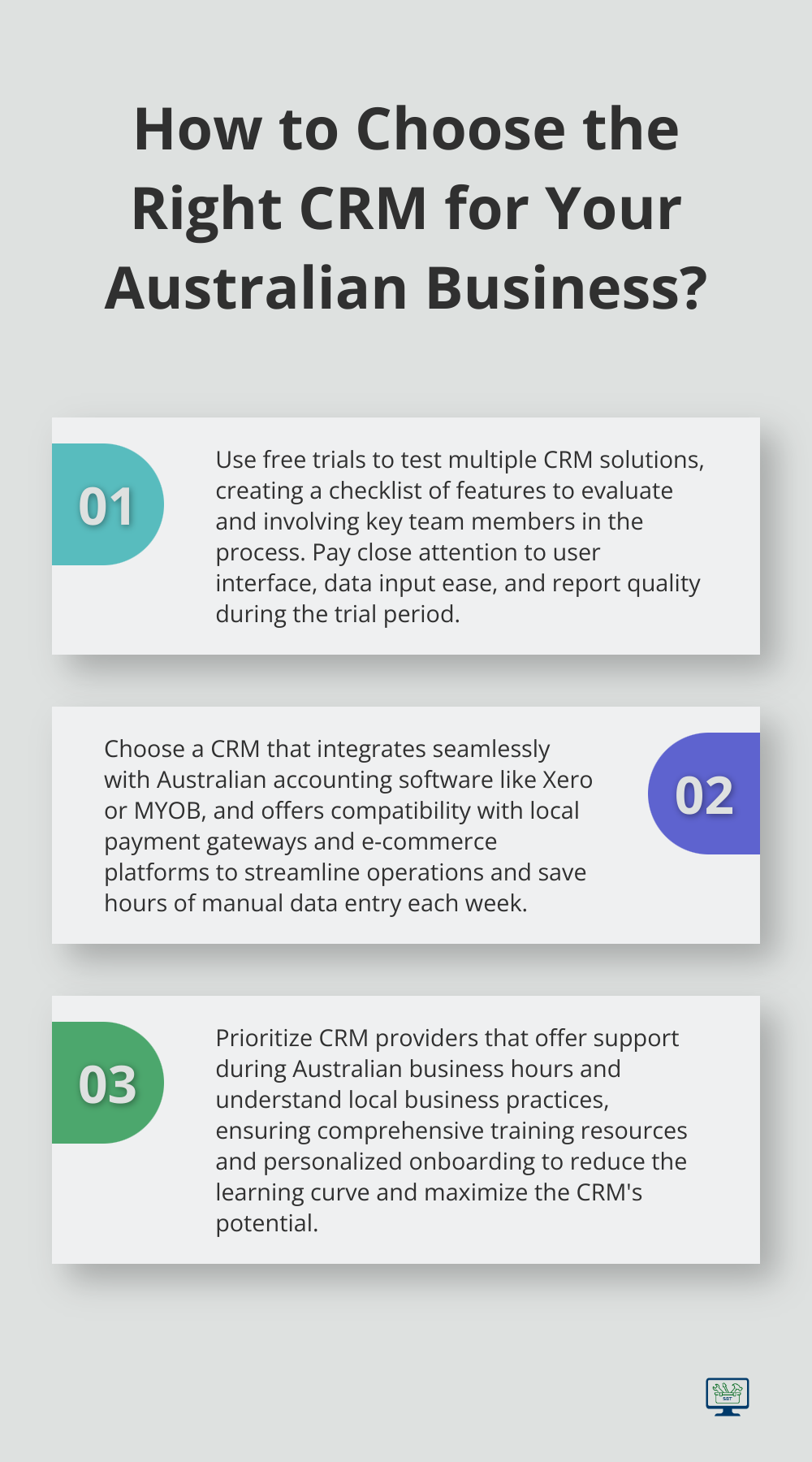
Selecting the perfect CRM requires careful consideration of your business requirements, budget constraints, and future growth plans. Take advantage of free trials and thoroughly evaluate each option before making a decision. Expert advice can also prove invaluable in this process.
SmallBizToolbox understands the unique challenges faced by Australian small businesses. Our comprehensive suite of tools (including CRM functionalities) supports your business growth journey. With our 7-day free trial, you can explore how our solutions enhance your CRM implementation and overall business operations.
How useful was this Resource?
Click on a star to rate it!
Average rating 0 / 5. Vote count: 0
No votes so far! Be the first to rate this post.
We are sorry that this post was not useful for you!
Let us improve this Resource!
Tell us how we can improve this Resource?

